![[SOLD OUT] Book-Club | The Ladies of the House of Love: “Horrid Novels”: Gothic Inspirations for Jane Austen’s Northanger Abbey | In-Person](https://images.squarespace-cdn.com/content/v1/66fb68a83ed38c0c99c762f9/1739909001171-JU5KCTYLTS7TVHWX5MQ5/Northanger-course-graphic.jpg)
[SOLD OUT] Book-Club | The Ladies of the House of Love: “Horrid Novels”: Gothic Inspirations for Jane Austen’s Northanger Abbey | In-Person
May 13, 2025 | 6:30 pm - 8:00 pm
June 3, 2025 | 6:30 pm - 8:00 pm
July 8, 2025 | 6:30 pm - 8:00 pm
September 9, 2025 | 6:30 pm - 8:00 pm
October 14, 2025 | 6:30 pm - 8:00 pm
November 11, 2025 | 6:30 pm - 8:00 pm
December 9, 2025 | 6:30 pm - 8:00 pm
This special book club season of The Ladies of the House of Love will begin with three iconic Gothic works, including one, Ann Radcliffe’s The Mysteries of Udolpho (1794), that Austen heavily satirizes in Northanger Abbey. Then, the club will explore lesser-known books that Austen references as “horrid novels” in Northanger. Finally, on December 9, 2025, just one week before Austen’s 250th birthday, the club will read Northanger Abbey and hold a birthday party for the Authoress. Don’t miss this unique opportunity to immerse yourself in the world of the Gothic as part of a community of fellow book lovers and Janeites!

Behind the Bookcase Tour | Mexico: Race and Revolution in the Borderlands | In-Person
The Spanish Empire and, later, Mexico relied on ink, paper, and the flow of information to rule over thousands of miles of territory and a complex web of people of various races and ethnicities. On this tour, you will meet Indigenous peoples, mestizos (people of mixed Indigenous and European ancestry), Europeans, and African peoples both free and enslaved.

Course | Reading Austen’s Mansfield Park with Juliette Wells | Virtual
In this four-week course (Wednesdays, July 16, 23, 30, August 6), we will read and discuss Mansfield Park in relation to key artifacts and documents that shed light on its place in Austen’s literary career.

Behind the Bookcase Tour | Remembering Scotland’s Bard: The Music, Myth & Memory of Robert Burns | In-Person
The Rosenbach Museum & Library holds one of the world’s most significant collections of Burns letters, literary manuscripts, rare books, and artifacts. In this special, hands-on Behind the Bookcase tour, timed to coincide with the 229th anniversary of Burns’s death on July 21, we will consider enshrinements of Burns and in Burns’s literary works. Even as the poet celebrates life, his work is shot through with meditations on death.

Behind the Bookcase Tour | Elementary! Sherlock Holmes and Consulting Detectives | In-Person
For over a century, readers have been thrilled by Arthur Conan Doyle’s adventures of the world’s first consulting detective, Sherlock Holmes, and his assistant, Dr. John Watson, as they battled the criminal forces of London. We’ll use our magnifying glasses to inspect not only first editions of these stories and Doyle’s handwritten manuscript of the Holmes story, “The Adventure of the Empty House,” but also investigate some of the earlier influences of the mystery/detective genre, like Edgar Allan Poe and Charles Dickens.

Behind the Bookcase Tour | Remembering Scotland’s Bard: The Music, Myth & Memory of Robert Burns | In-Person
The Rosenbach Museum & Library holds one of the world’s most significant collections of Burns letters, literary manuscripts, rare books, and artifacts. In this special, hands-on Behind the Bookcase tour, timed to coincide with the 229th anniversary of Burns’s death on July 21, we will consider enshrinements of Burns and in Burns’s literary works. Even as the poet celebrates life, his work is shot through with meditations on death.

Behind the Bookcase Tour | A Warm Heart and a Cold Eye: The Legacy of Herman Melville | In-Person
Herman Melville possessed a warm heart for human nature, a cold eye for the human condition, and the ability to write prose that would awe a Biblical prophet. Join an odyssey through the Rosenbach’s mighty Melville collection in this Behind the Bookcase tour.

Behind the Bookcase Tour | Southern Gothic | In-Person
Look at rare books and manuscripts in the Rosenbach’s collection and read aloud some of the most gothic of the Southern Gothic in Dr. Rosenbach’s historic library.

Course | Reading J.R.R. Tolkien’s The Lord of the Rings with Professor Michael D. C. Drout | Virtual
In this eight-session course (Wednesdays, 8/13, 8/27, 9/10, 9/24, 10/8, 10/22, 11/5, 11/19) we will try to identify the qualities that make Tolkien’s works emotionally and intellectually engaging while seeking to better understand their significance. In exploring the rich complexity of Middle-earth, the phonesthetic beauty of Tolkien’s languages, the intricacy of the narrative, and the sophistication of the moral vision, we will seek to understand not merely his works’ popularity, cultural influence, and artistic success, but the personal significance they hold for many readers.

Course | Book Arts: Binding Community Cookbooks | In Person
In this hands-on bookmaking class, learn to craft your own card-keeper recipe book and exchange recipes (and the stories behind them) with your fellow attendees. You’ll leave with a feast’s worth of recipes to try and a whole new way to share the food that matters to you with the people who matter to you.

Behind the Bookcase Tour | History and Future of the American Presidency | In-Person
Join the Rosenbach Museum & Library in considering the development of the office of the presidency over the last 249 years. View rare books and manuscripts documenting presidential history from George Washington to Franklin Delano Roosevelt; discuss how the powers of the executive office fit into the separation of powers as outlined in the U.S. Constitution; and reflect on the evolving role of the presidency in the wider work of the federal government and American national life. The tour will include time for reflection and dialogue among participants about the executive office and civic participation.

Course | Book Arts: Intermediate Calligraphy and Bookmaking with Susan vonMedicus | In Person
In this two-part class (Sunday, September 7th and Sunday, September 14th), attendees will be immersed in the centuries-old traditions of calligraphy and bookbinding. Students will study lettering traditions from around the world, including the Uncial script found in the Book of Kells and other early Irish manuscripts, while exploring how calligraphy interacts with the book format and creating their own exciting compositions.
![[SOLD OUT] Book-Club | The Ladies of the House of Love: “Horrid Novels”: Gothic Inspirations for Jane Austen’s Northanger Abbey | In-Person](https://images.squarespace-cdn.com/content/v1/66fb68a83ed38c0c99c762f9/1739909001171-JU5KCTYLTS7TVHWX5MQ5/Northanger-course-graphic.jpg)
[SOLD OUT] Book-Club | The Ladies of the House of Love: “Horrid Novels”: Gothic Inspirations for Jane Austen’s Northanger Abbey | In-Person
May 13, 2025 | 6:30 pm - 8:00 pm
June 3, 2025 | 6:30 pm - 8:00 pm
July 8, 2025 | 6:30 pm - 8:00 pm
September 9, 2025 | 6:30 pm - 8:00 pm
October 14, 2025 | 6:30 pm - 8:00 pm
November 11, 2025 | 6:30 pm - 8:00 pm
December 9, 2025 | 6:30 pm - 8:00 pm
This special book club season of The Ladies of the House of Love will begin with three iconic Gothic works, including one, Ann Radcliffe’s The Mysteries of Udolpho (1794), that Austen heavily satirizes in Northanger Abbey. Then, the club will explore lesser-known books that Austen references as “horrid novels” in Northanger. Finally, on December 9, 2025, just one week before Austen’s 250th birthday, the club will read Northanger Abbey and hold a birthday party for the Authoress. Don’t miss this unique opportunity to immerse yourself in the world of the Gothic as part of a community of fellow book lovers and Janeites!

Member Event | The Delancey Society Fall Kick-off | In-Person
Celebrate the start of the fall season at the Rosenbach with cocktails, light fare, and a special after-hours opportunity to visit our permanent galleries, Treasures from the Rosenbach’s Collection.

Behind the Bookcase Tour | Sleuths and Spies | In-Person
The game is afoot! Investigate the realm of detective and spy literature in this Behind the Bookcase tour. Your mission, should you choose to accept it, is to discover connections between famous fictional mysteries and the lives—and legacies—of real-world spies. Explore early mystery stories including Charles Dickens’s Bleak House, examine an original cypher belonging to a female socialite and Civil War spy, and exercise your sleuthing skills to detect a forgery in the Rosenbach’s collection.

Book Club | The Republic of Letters: Spies & Spycraft in American History, in Partnership with Carpenters’ Hall
This American history book club is a partnership of Carpenters’ Hall and the Rosenbach Museum & Library. Sessions meet variously at Carpenters’ Hall and the Rosenbach; check individual program descriptions for details. At least one book club session in the season will include a presentation of rare collection materials related to the themes and topics under discussion during the meetings.

Behind the Bookcase Tour | Elementary! Sherlock Holmes and Consulting Detectives | In-Person
For over a century, readers have been thrilled by Arthur Conan Doyle’s adventures of the world’s first consulting detective, Sherlock Holmes, and his assistant, Dr. John Watson, as they battled the criminal forces of London. We’ll use our magnifying glasses to inspect not only first editions of these stories and Doyle’s handwritten manuscript of the Holmes story, “The Adventure of the Empty House,” but also investigate some of the earlier influences of the mystery/detective genre, like Edgar Allan Poe and Charles Dickens.

Course | The Soul Selects: Yoga & the Poetry of Emily Dickinson –Solitude & the Inner World | In-Person
The apparent simplicity of Emily Dickinson’s poetry is deceptive—beneath her brief, direct language lies profound depths of emotion and insight. In this three-part yoga series, we’ll explore her life and work through movement, breath, and reflection. Each session will weave selected poems into a gentle and meditative yoga sequence, inviting you to embody Dickinson’s themes of solitude, transformation, and wonder.

Behind the Bookcase Tour | Book Arts: The World Between the Covers | In-Person
In this tour, we’ll connect historical treasures of the Rosenbach collections to the contemporary creative field of Book Arts.

Fall Open House
This free, casual open house is the perfect way to explore the Rosenbach at your own pace and introduce your friends and neighbors to the institution.
![[SOLD OUT] Book-Club | The Ladies of the House of Love: “Horrid Novels”: Gothic Inspirations for Jane Austen’s Northanger Abbey | In-Person](https://images.squarespace-cdn.com/content/v1/66fb68a83ed38c0c99c762f9/1739909001171-JU5KCTYLTS7TVHWX5MQ5/Northanger-course-graphic.jpg)
[SOLD OUT] Book-Club | The Ladies of the House of Love: “Horrid Novels”: Gothic Inspirations for Jane Austen’s Northanger Abbey | In-Person
May 13, 2025 | 6:30 pm - 8:00 pm
June 3, 2025 | 6:30 pm - 8:00 pm
July 8, 2025 | 6:30 pm - 8:00 pm
September 9, 2025 | 6:30 pm - 8:00 pm
October 14, 2025 | 6:30 pm - 8:00 pm
November 11, 2025 | 6:30 pm - 8:00 pm
December 9, 2025 | 6:30 pm - 8:00 pm
This special book club season of The Ladies of the House of Love will begin with three iconic Gothic works, including one, Ann Radcliffe’s The Mysteries of Udolpho (1794), that Austen heavily satirizes in Northanger Abbey. Then, the club will explore lesser-known books that Austen references as “horrid novels” in Northanger. Finally, on December 9, 2025, just one week before Austen’s 250th birthday, the club will read Northanger Abbey and hold a birthday party for the Authoress. Don’t miss this unique opportunity to immerse yourself in the world of the Gothic as part of a community of fellow book lovers and Janeites!

Book Club | The Republic of Letters: Spies & Spycraft in American History, in Partnership with Carpenters’ Hall
This American history book club is a partnership of Carpenters’ Hall and the Rosenbach Museum & Library. Sessions meet variously at Carpenters’ Hall and the Rosenbach; check individual program descriptions for details. At least one book club session in the season will include a presentation of rare collection materials related to the themes and topics under discussion during the meetings.
![[SOLD OUT] Book-Club | The Ladies of the House of Love: “Horrid Novels”: Gothic Inspirations for Jane Austen’s Northanger Abbey | In-Person](https://images.squarespace-cdn.com/content/v1/66fb68a83ed38c0c99c762f9/1739909001171-JU5KCTYLTS7TVHWX5MQ5/Northanger-course-graphic.jpg)
[SOLD OUT] Book-Club | The Ladies of the House of Love: “Horrid Novels”: Gothic Inspirations for Jane Austen’s Northanger Abbey | In-Person
May 13, 2025 | 6:30 pm - 8:00 pm
June 3, 2025 | 6:30 pm - 8:00 pm
July 8, 2025 | 6:30 pm - 8:00 pm
September 9, 2025 | 6:30 pm - 8:00 pm
October 14, 2025 | 6:30 pm - 8:00 pm
November 11, 2025 | 6:30 pm - 8:00 pm
December 9, 2025 | 6:30 pm - 8:00 pm
This special book club season of The Ladies of the House of Love will begin with three iconic Gothic works, including one, Ann Radcliffe’s The Mysteries of Udolpho (1794), that Austen heavily satirizes in Northanger Abbey. Then, the club will explore lesser-known books that Austen references as “horrid novels” in Northanger. Finally, on December 9, 2025, just one week before Austen’s 250th birthday, the club will read Northanger Abbey and hold a birthday party for the Authoress. Don’t miss this unique opportunity to immerse yourself in the world of the Gothic as part of a community of fellow book lovers and Janeites!

Book Club | The Republic of Letters: Spies & Spycraft in American History, in Partnership with Carpenters’ Hall
This American history book club is a partnership of Carpenters’ Hall and the Rosenbach Museum & Library. Sessions meet variously at Carpenters’ Hall and the Rosenbach; check individual program descriptions for details. At least one book club session in the season will include a presentation of rare collection materials related to the themes and topics under discussion during the meetings.
![[SOLD OUT] Book-Club | The Ladies of the House of Love: “Horrid Novels”: Gothic Inspirations for Jane Austen’s Northanger Abbey | In-Person](https://images.squarespace-cdn.com/content/v1/66fb68a83ed38c0c99c762f9/1739909001171-JU5KCTYLTS7TVHWX5MQ5/Northanger-course-graphic.jpg)
[SOLD OUT] Book-Club | The Ladies of the House of Love: “Horrid Novels”: Gothic Inspirations for Jane Austen’s Northanger Abbey | In-Person
May 13, 2025 | 6:30 pm - 8:00 pm
June 3, 2025 | 6:30 pm - 8:00 pm
July 8, 2025 | 6:30 pm - 8:00 pm
September 9, 2025 | 6:30 pm - 8:00 pm
October 14, 2025 | 6:30 pm - 8:00 pm
November 11, 2025 | 6:30 pm - 8:00 pm
December 9, 2025 | 6:30 pm - 8:00 pm
This special book club season of The Ladies of the House of Love will begin with three iconic Gothic works, including one, Ann Radcliffe’s The Mysteries of Udolpho (1794), that Austen heavily satirizes in Northanger Abbey. Then, the club will explore lesser-known books that Austen references as “horrid novels” in Northanger. Finally, on December 9, 2025, just one week before Austen’s 250th birthday, the club will read Northanger Abbey and hold a birthday party for the Authoress. Don’t miss this unique opportunity to immerse yourself in the world of the Gothic as part of a community of fellow book lovers and Janeites!

Book Club | The Republic of Letters: Spies & Spycraft in American History, in Partnership with Carpenters’ Hall
This American history book club is a partnership of Carpenters’ Hall and the Rosenbach Museum & Library. Sessions meet variously at Carpenters’ Hall and the Rosenbach; check individual program descriptions for details. At least one book club session in the season will include a presentation of rare collection materials related to the themes and topics under discussion during the meetings.

Book Club | The Republic of Letters: Spies & Spycraft in American History, in Partnership with Carpenters’ Hall
This American history book club is a partnership of Carpenters’ Hall and the Rosenbach Museum & Library. Sessions meet variously at Carpenters’ Hall and the Rosenbach; check individual program descriptions for details. At least one book club session in the season will include a presentation of rare collection materials related to the themes and topics under discussion during the meetings.

Book Club | The Republic of Letters: Spies & Spycraft in American History, in Partnership with Carpenters’ Hall
This American history book club is a partnership of Carpenters’ Hall and the Rosenbach Museum & Library. Sessions meet variously at Carpenters’ Hall and the Rosenbach; check individual program descriptions for details. At least one book club session in the season will include a presentation of rare collection materials related to the themes and topics under discussion during the meetings.

Book Club | The Republic of Letters: Spies & Spycraft in American History, in Partnership with Carpenters’ Hall
This American history book club is a partnership of Carpenters’ Hall and the Rosenbach Museum & Library. Sessions meet variously at Carpenters’ Hall and the Rosenbach; check individual program descriptions for details. At least one book club session in the season will include a presentation of rare collection materials related to the themes and topics under discussion during the meetings.
![[SOLD OUT] The Rosenbach Presents | Grace’s Guncle: Exploring the Little-Known Influence of Princess Grace Kelly’s Gay Uncle on Her Artistic Career | In-Person](https://images.squarespace-cdn.com/content/v1/66fb68a83ed38c0c99c762f9/1741364899785-WXSZOGTGUPDWUZYKILT0/Kelly+House.jpg)
[SOLD OUT] The Rosenbach Presents | Grace’s Guncle: Exploring the Little-Known Influence of Princess Grace Kelly’s Gay Uncle on Her Artistic Career | In-Person
Join the Rosenbach Museum & Library and the DVLF, Philadelphia’s LGBTQ+ community foundation, for a rare opportunity to step inside Princess Grace’s childhood home for a conversation about George Kelly’s identity as a gay man within a proud Irish Catholic immigrant family that prized traditional masculinity.
![[SOLD OUT] Course | Book Arts: Revolutionary Pamphlets and Zines | In Person](https://images.squarespace-cdn.com/content/v1/66fb68a83ed38c0c99c762f9/1741370851128-04BBP08W2EMUWYTSLQ5E/Revolutionary+Pamphlets.JPEG)
[SOLD OUT] Course | Book Arts: Revolutionary Pamphlets and Zines | In Person
In this hands-on class, you will learn to create dynamic booklets of your own, from the humble pamphlet to a single-sheet book to the French door zine. No prior zine-making experience is required.
![[CANCELLED] Behind the Bookcase Tour | Fakes & Forgeries | In-Person](https://images.squarespace-cdn.com/content/v1/66fb68a83ed38c0c99c762f9/1741288767131-E0VG4EEQ5KGJNN05L7SZ/Fakes+and+Forgeries+BtB.JPG)
[CANCELLED] Behind the Bookcase Tour | Fakes & Forgeries | In-Person
What is the difference between a fake and a forgery? How do either of those differ from a copy? And why does authenticity matter in museum collections? On this tour, we’ll explore these questions by using a wide range of objects in the Rosenbach’s renowned collection.
![[SOLD OUT] The Rosenbach Presents | Gallery Talk & Neighborhood Walking Tour with Treasures Featured Artist John Y. Wind | In-Person](https://images.squarespace-cdn.com/content/v1/66fb68a83ed38c0c99c762f9/1741836846581-M66HQFMEGGUHFIEBL722/John+Yaron+Wind+horizontal+photo+credit+Christopher+Tyler+Studio.JPG)
[SOLD OUT] The Rosenbach Presents | Gallery Talk & Neighborhood Walking Tour with Treasures Featured Artist John Y. Wind | In-Person
Join artist John Y. Wind at the Rosenbach’s brand new exhibition, Treasures from the Rosenbach’s Collection: History of the Material Text for a special viewing of his artworks and a tour of the show before stepping outside for a walk to the John Frederick Lewis / John Yaron Wind home on Delancey Place.

Biblioventures | Sherlock Monthly | Virtual
November 16, 2025 | 2:00 pm - 4:00 pm
December 14, 2025 | 2:00 pm - 4:00 pm
January 11, 2025 | 2:00 pm - 4:00 pm
February 15, 2025 | 2:00 pm - 4:00 pm
March 15, 2025 | 2:00 pm - 4:00 pm
April 19, 2025 | 2:00 pm - 4:00 pm
May 17, 2025 | 2:00 pm - 4:00 pm
June 21, 2025 | 2:00 pm - 4:00 pm
Our Sherlock Mondays Biblioventure was such a success, we’ve decided to continue exploring the Sherlockian canon with Sherlock Monthly. Every month, we’ll focus on one Sherlock Holmes adventure in the order they were first published.

The 2025 Bloomsday Festival
Every June 16, we gather together to read from Joyce’s Ulysses. It’s a beloved and foundational event for this institution, the home of Joyce’s manuscript of a novel that continues to inspire, scandalize, and thrill.

Member Event | Breakfast with the Director and Gallery Talk | In-Person
Members are invited to join Kelsey Scouten Bates, The John C. Haas Director of the Rosenbach, and artist John Y. Wind for a fun morning of coffee and conversation.
![[SOLD OUT] Behind the Bookcase Tour | Rebellious Love: Exploring Queer History, Art, and Literature | In-Person](https://images.squarespace-cdn.com/content/v1/66fb68a83ed38c0c99c762f9/1741288406389-2KX9LL4GBI4G0FEPU4Y2/Rebellious+Love.png)
[SOLD OUT] Behind the Bookcase Tour | Rebellious Love: Exploring Queer History, Art, and Literature | In-Person
In this tour, we will meet Queer people from history and consider how their diverse identities shaped their lives and informed their work.
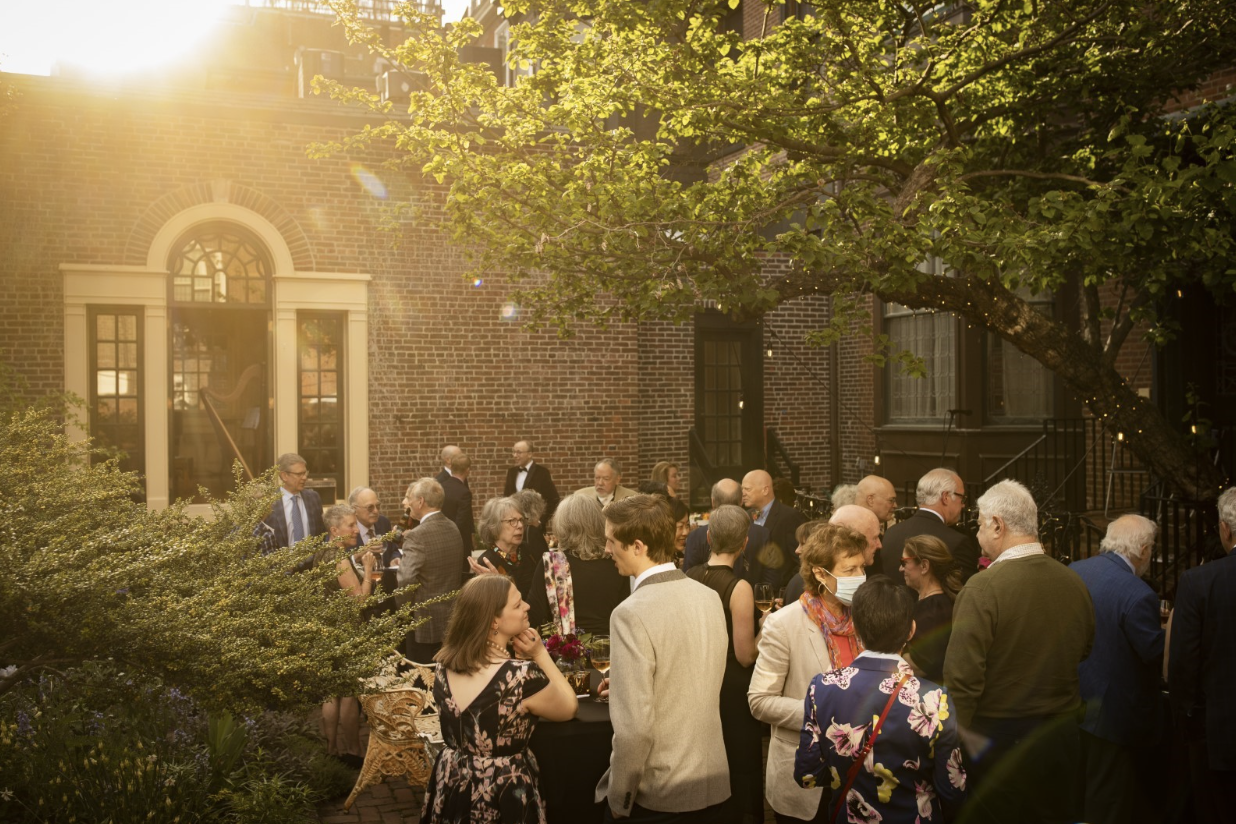
Parties | Delancey Society Spring Soirée | In-Person
Join the Rosenbach Board and Delancey Society for our festive annual Spring Soirée.
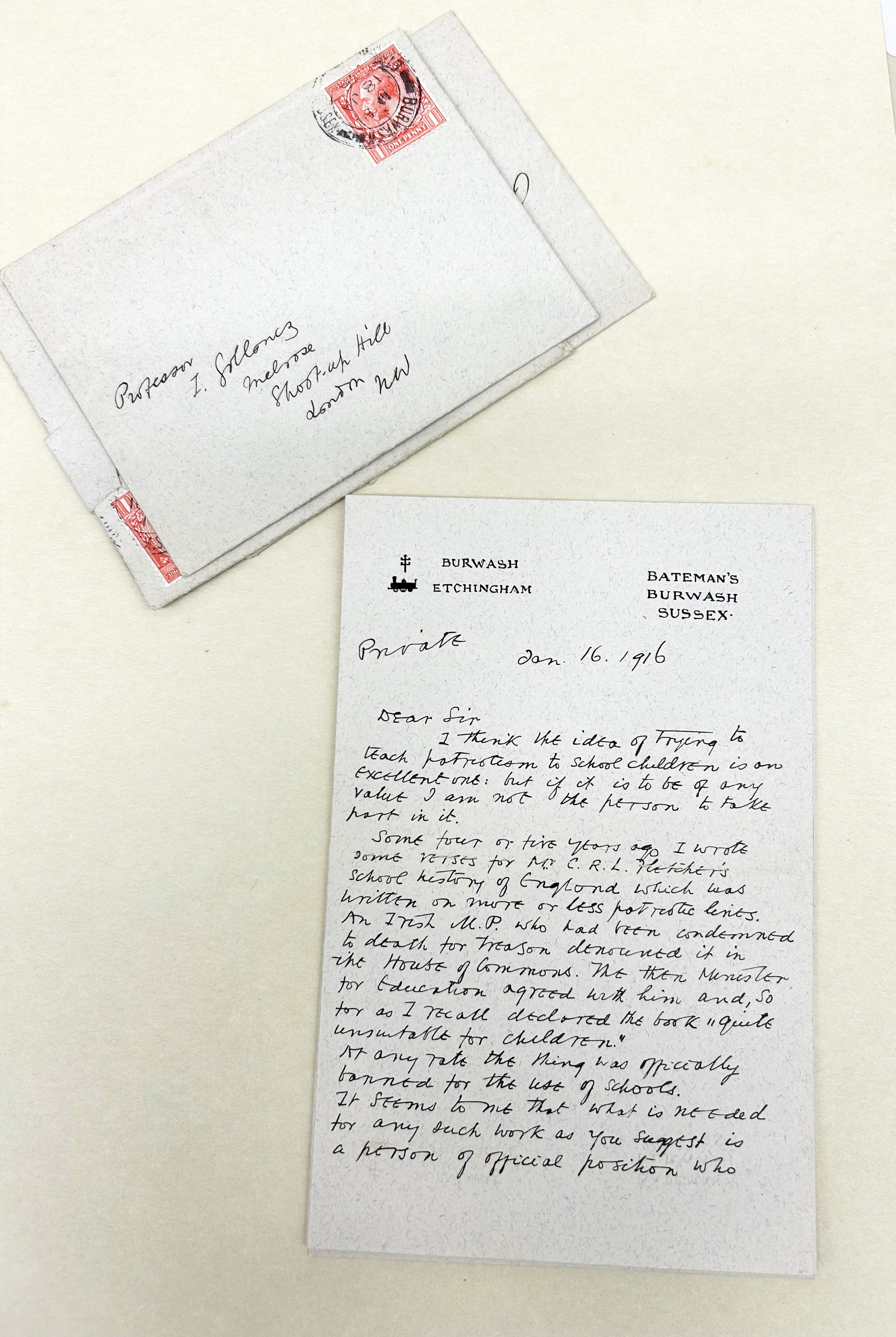
Behind the Bookcase Tour | Fiction is a Lie: Writers on Writing | In-Person
During this tour, learn how writers such as Lewis Carroll, Eudora Welty and Rudyard Kipling approached the craft of writing.
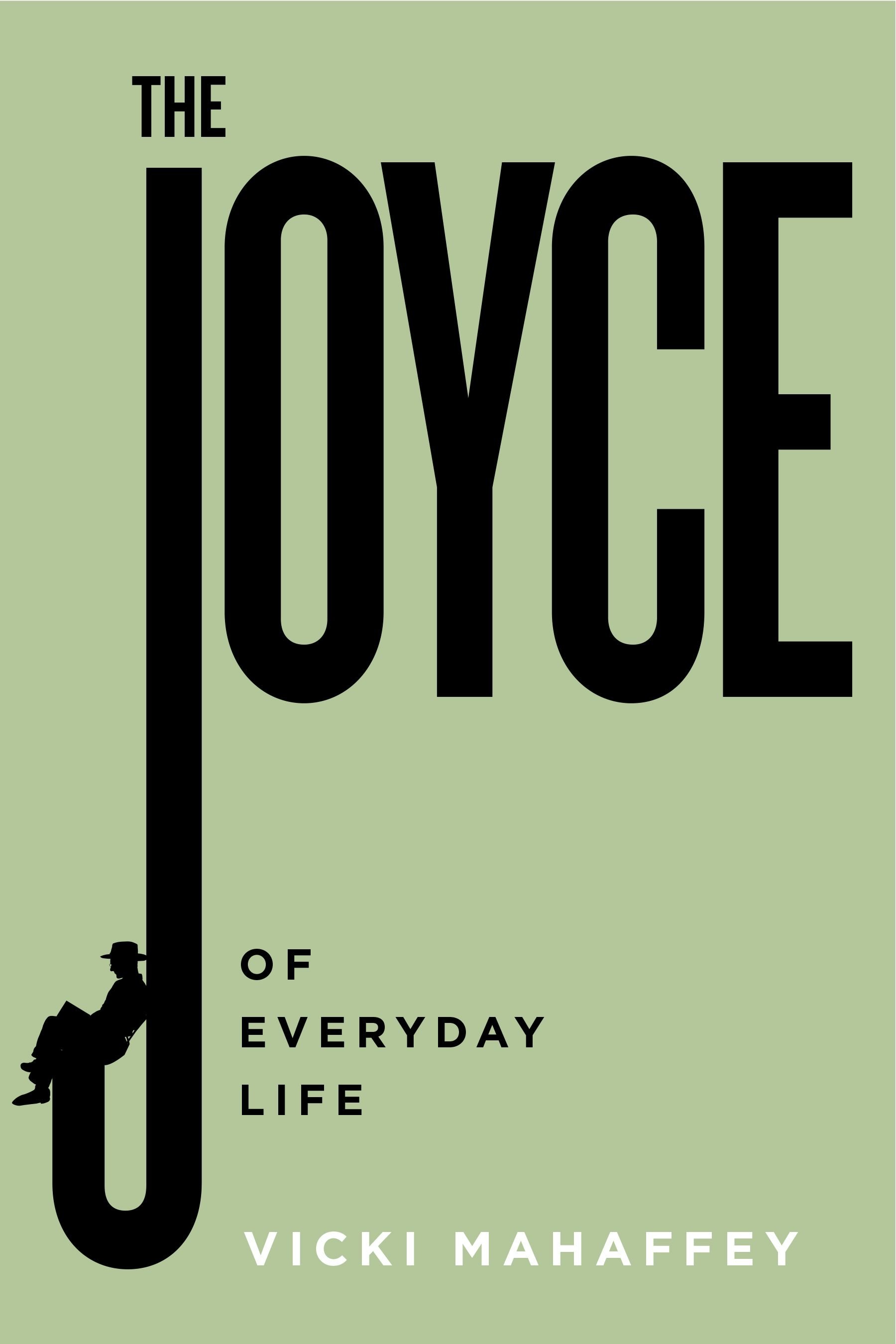
The Rosenbach Presents | The Annual Rosenbach Bloomsday Virtual Talk: The Joyce of Everyday Life with Vicki Mahaffey | Virtual
Acclaimed Joyce scholar Vicki Mahaffey will lead our annual Bloomsday virtual discussion on her new book, The Joyce of Everyday Life.
![[SOLD OUT] The Rosenbach Presents | Jane Austen Tea Party in the Rosenbach’s Dining Room | In-Person](https://images.squarespace-cdn.com/content/v1/66fb68a83ed38c0c99c762f9/1741363917832-C1R6OCGR7EDI9DU4VMU6/Austen+-+Pride+and+Prejudice.jpg)
[SOLD OUT] The Rosenbach Presents | Jane Austen Tea Party in the Rosenbach’s Dining Room | In-Person
It is a truth universally acknowledged that rare books and afternoon tea make for a delightful combination! Join the Rosenbach Museum & Library for an unforgettable afternoon voyage into the literary world of Jane Austen.

Excursion | Cocktails and Conversation with John Y. Wind presented by the Young Friends of the Rosenbach | In-Person
Join us as we celebrate the June 2025 opening of artist John Y. Wind’s new exhibition, “DEAR JOHN” John Frederick Lewis, John Yaron Wind and the Rosenbach Brothers, that will be featured in the Rosenbach’s newest permanent collection gallery, Treasures from the Rosenbach’s Collection: History of the Material Text.
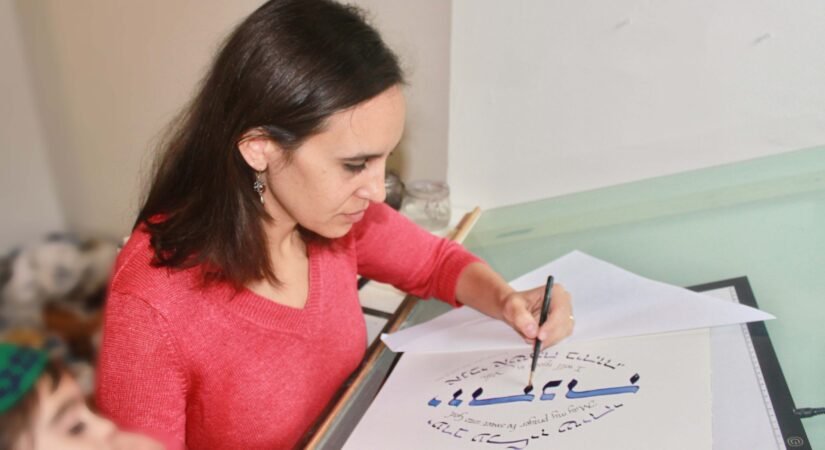
Workshop | Calligraphy: The Art of the Hebrew Letter | In-Person
September 22, 2025 | 2:00 pm - 4:00 pm
November 3, 2025 | 2:00 pm - 4:00 pm
February 23, 2025 | 2:00 pm - 4:00 pm
May 18, 2025 | 2:00 pm - 4:00 pm
In this four-part workshop series, explore the creativity and connection that live within the art of Hebrew lettering.

Biblioventures | Sherlock Monthly | Virtual
November 16, 2025 | 2:00 pm - 4:00 pm
December 14, 2025 | 2:00 pm - 4:00 pm
January 11, 2025 | 2:00 pm - 4:00 pm
February 15, 2025 | 2:00 pm - 4:00 pm
March 15, 2025 | 2:00 pm - 4:00 pm
April 19, 2025 | 2:00 pm - 4:00 pm
May 17, 2025 | 2:00 pm - 4:00 pm
June 21, 2025 | 2:00 pm - 4:00 pm
Our Sherlock Mondays Biblioventure was such a success, we’ve decided to continue exploring the Sherlockian canon with Sherlock Monthly. Every month, we’ll focus on one Sherlock Holmes adventure in the order they were first published.
![[SOLD OUT] Book-Club | The Ladies of the House of Love: “Horrid Novels”: Gothic Inspirations for Jane Austen’s Northanger Abbey | In-Person](https://images.squarespace-cdn.com/content/v1/66fb68a83ed38c0c99c762f9/1739909001171-JU5KCTYLTS7TVHWX5MQ5/Northanger-course-graphic.jpg)
[SOLD OUT] Book-Club | The Ladies of the House of Love: “Horrid Novels”: Gothic Inspirations for Jane Austen’s Northanger Abbey | In-Person
May 13, 2025 | 6:30 pm - 8:00 pm
June 3, 2025 | 6:30 pm - 8:00 pm
July 8, 2025 | 6:30 pm - 8:00 pm
September 9, 2025 | 6:30 pm - 8:00 pm
October 14, 2025 | 6:30 pm - 8:00 pm
November 11, 2025 | 6:30 pm - 8:00 pm
December 9, 2025 | 6:30 pm - 8:00 pm
This special book club season of The Ladies of the House of Love will begin with three iconic Gothic works, including one, Ann Radcliffe’s The Mysteries of Udolpho (1794), that Austen heavily satirizes in Northanger Abbey. Then, the club will explore lesser-known books that Austen references as “horrid novels” in Northanger. Finally, on December 9, 2025, just one week before Austen’s 250th birthday, the club will read Northanger Abbey and hold a birthday party for the Authoress. Don’t miss this unique opportunity to immerse yourself in the world of the Gothic as part of a community of fellow book lovers and Janeites!
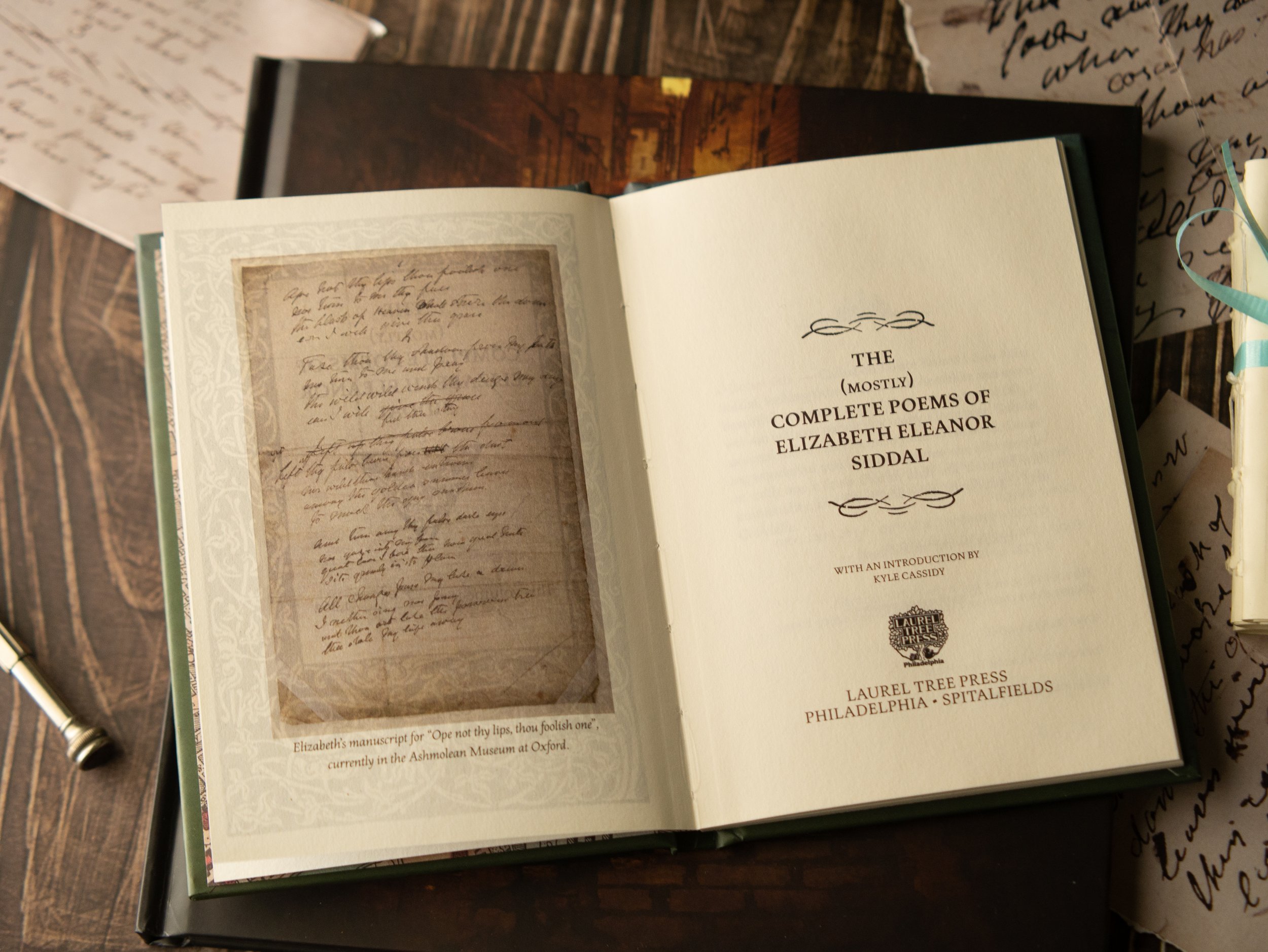
Behind the Bookcase Tour | Elizabeth Siddal and The Pre-Raphaelites with Jennifer Summerfield and Kyle Cassidy | In-Person
On this tour, explore the mythical, enchanting work of the Pre-Raphaelites through the Rosenbach’s collection, and then step into the life of the Pre-Raphaelite’s’ most recognizable muse, Elizabeth Eleanor Siddal, through the first popularly available edition of her poetry.
![[SOLD OUT] Behind the Bookcase Tour | Early Hebrew Books III | In-Person](https://images.squarespace-cdn.com/content/v1/66fb68a83ed38c0c99c762f9/1741212297974-Q0C4E663924ACJL5NCDE/EHBIII.PNG)
[SOLD OUT] Behind the Bookcase Tour | Early Hebrew Books III | In-Person
This in-depth tour brings us back to the early 18th century as we journey from New York City, home to America’s first Jewish community, to Cambridge, Massachusetts. Together, we’ll meet a vivid cast of characters, learn about a dramatic public spectacle in Harvard Yard, and work with some of Dr. Rosenbach’s treasures of early American Judaica.
![[SOLD OUT] The Republic of Letters: The Rosenbach’s American History Book Club, in Partnership with Carpenters’ Hall](https://images.squarespace-cdn.com/content/v1/66fb68a83ed38c0c99c762f9/1739813524817-0F4LWU0G67ZCAU0DHBQI/Republic-of-Letters-graphic.jpg)
[SOLD OUT] The Republic of Letters: The Rosenbach’s American History Book Club, in Partnership with Carpenters’ Hall
The book club’s first season is titled “The Founders, Revisited.” Inspired by rare books and manuscripts in the Rosenbach and Carpenters’ Hall collections, this season’s book club meetings will critically examine the contributions and complicated legacies of Benjamin Franklin, Thomas Jefferson, George Washington, Frederick Douglass, and Benjamin Rush.
![[SOLD OUT] Course | Book Arts: Intro to Celtic Calligraphy | In Person](https://images.squarespace-cdn.com/content/v1/66fb68a83ed38c0c99c762f9/1741369494085-B4971A692QW63WGSVZF8/Celtic_Calligraphy.jpg)
[SOLD OUT] Course | Book Arts: Intro to Celtic Calligraphy | In Person
In this two-hour, immersive, hands-on workshop, distinguished local Irish American calligrapher and manuscript illuminator Susan Kelly vonMedicus will introduce you to Irish manuscript heritage and teach the Uncial script found in the Book of Kells and other early Irish manuscripts.
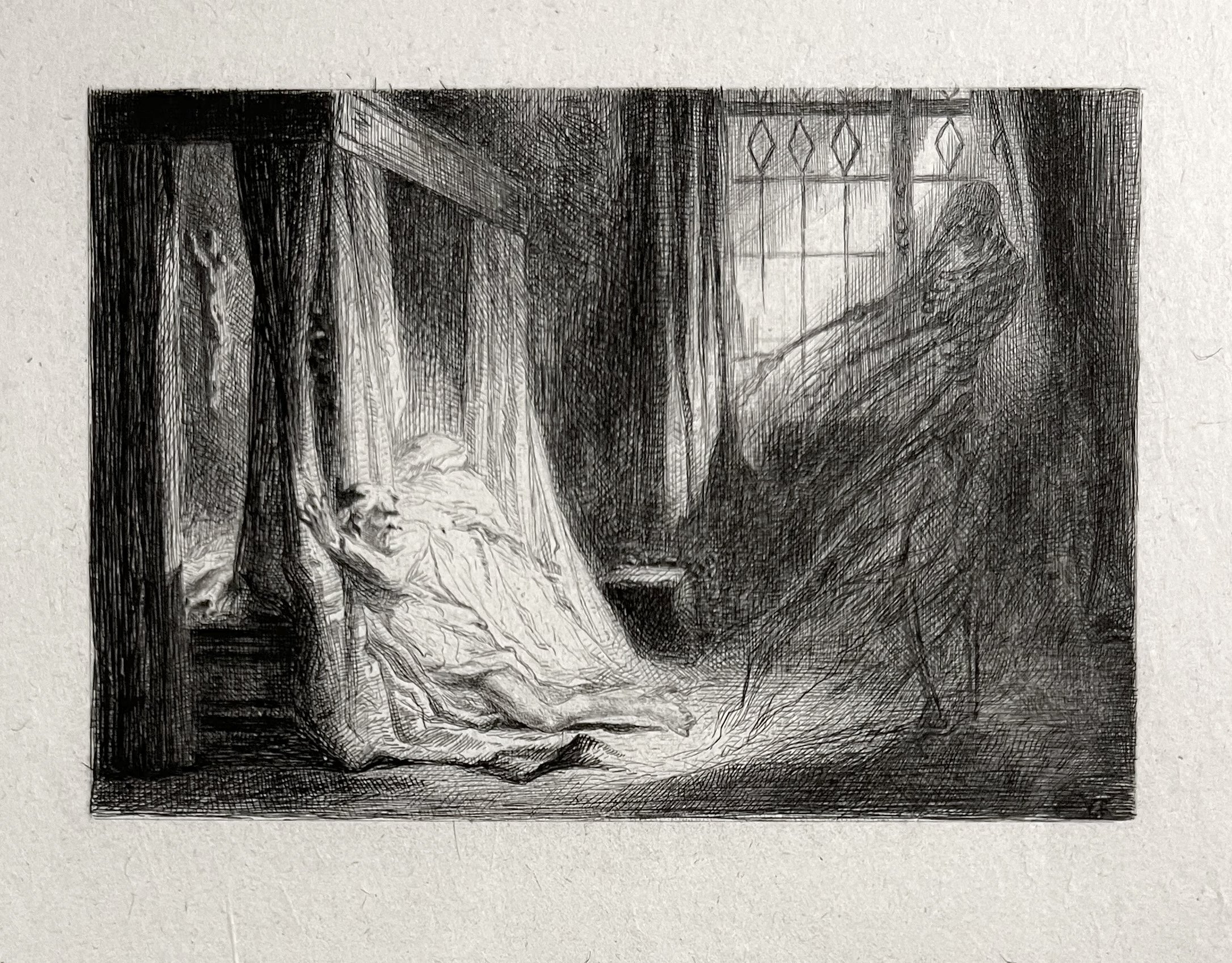
Course | Reading Emily Bronte’s Wuthering Heights with Claire O’Callaghan | Virtual
In this four-week course, we’ll journey into the pages of Wuthering Heights, the beloved novel written and published by Emily Brontë in 1847.
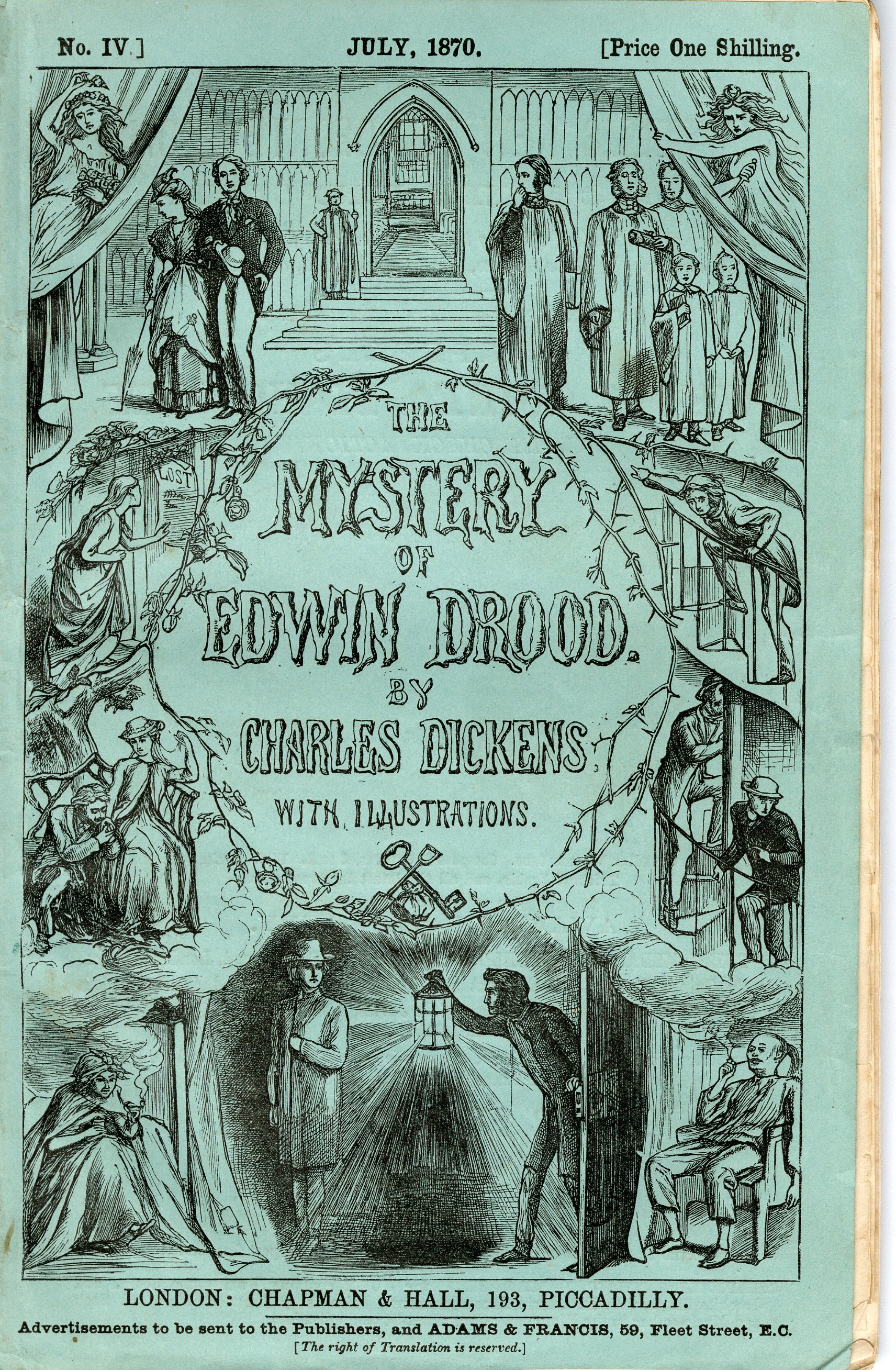
Course | Reading The Mystery of Edwin Drood serially with Edward G. Pettit | Virtual
The Rosenbach holds in its collection the original serial parts of The Mystery of Edwin Drood. Throughout this course, we’ll read the existing six serial parts as the first readers did, one part at a time for six sessions, then we’ll spend a final session discussing the many ways Dickens could have unspooled his final mystery, perhaps even solving the mystery of Edwin Drood itself.
![[SOLD OUT] Behind the Bookcase Tour | Mexico: Race and Revolution in the Borderlands | In-Person](https://images.squarespace-cdn.com/content/v1/66fb68a83ed38c0c99c762f9/1741207004471-86AP552TA63W5S5ACZTJ/Race_Revolution.jpg)
[SOLD OUT] Behind the Bookcase Tour | Mexico: Race and Revolution in the Borderlands | In-Person
This tour features the Rosenbach’s collections from Mexico and Texas, including materials from the Spanish Empire, the early years of Mexican independence, and relations with the expanding United States in the 1800s.
![[ONE SEAT REMAINING] Course | Supreme Injustice: Slavery, The Constitution, and the U.S Supreme Court with Paul Finkelman | In Person](https://images.squarespace-cdn.com/content/v1/66fb68a83ed38c0c99c762f9/1741368106654-VZSC9HPGQODD1NQQQQZM/Supreme+Injustice.jpg)
[ONE SEAT REMAINING] Course | Supreme Injustice: Slavery, The Constitution, and the U.S Supreme Court with Paul Finkelman | In Person
This engaging seminar, held in the Rosenbach’s historic house, will begin with a discussion of how slavery helped shape the Constitution, which ironically, was written in Pennsylvania–the first state in the nation and the first political jurisdiction in the Western World to take steps to end slavery.

Rosenbacchanal 2025
Rosenbacchanal 2025: The Power of the Book will feature a conversation between writer and essayist Adam Gopnik, best known as a staff writer at The New Yorker for the past forty years, and Honoree Arthur Spector, the Rosenbach’s Chair Emeritus. Their discussion will explore the allure, the potency, and the omnipresence of one the most powerful objects the world has ever known: the book.

Behind the Bookcase Tour | Curiouser and Curiouser: A Look at Lewis Carroll | In-Person
Mathematician and cleric Charles Lutwidge Dodgson published children’s books under the pen name Lewis Carroll. This tour explores both the man and the author with the help of letters from Dodgson to his publishers, original drawings by John Tenniel (the illustrator of the Alice books), photographs of children taken by Dodgson, and of course, copies of his books.

Course | Reading Jane Austen’s Persuasion with Paula Byrne | Virtual
Persuasion is often considered Austen’s autumnal novel, her most mature work, and a farewell to her life as a fiction writer. In this course, we will examine the many ways in which she deploys her satire, and we will explore the novel’s themes of heartbreak, hope, personal growth, and second-chance love.

Biblioventures | Sherlock Monthly | Virtual
November 16, 2025 | 2:00 pm - 4:00 pm
December 14, 2025 | 2:00 pm - 4:00 pm
January 11, 2025 | 2:00 pm - 4:00 pm
February 15, 2025 | 2:00 pm - 4:00 pm
March 15, 2025 | 2:00 pm - 4:00 pm
April 19, 2025 | 2:00 pm - 4:00 pm
May 17, 2025 | 2:00 pm - 4:00 pm
June 21, 2025 | 2:00 pm - 4:00 pm
Our Sherlock Mondays Biblioventure was such a success, we’ve decided to continue exploring the Sherlockian canon with Sherlock Monthly. Every month, we’ll focus on one Sherlock Holmes adventure in the order they were first published.

Teacher Workshop | Lit Lives: A Workshop for Middle and High School English Teachers | In-Person
When high school English students connect with the Rosenbach's collection of rare editions and personal letters, they learn that Emily Dickinson was more than an isolated woman with a severe hairstyle and a long white dress…
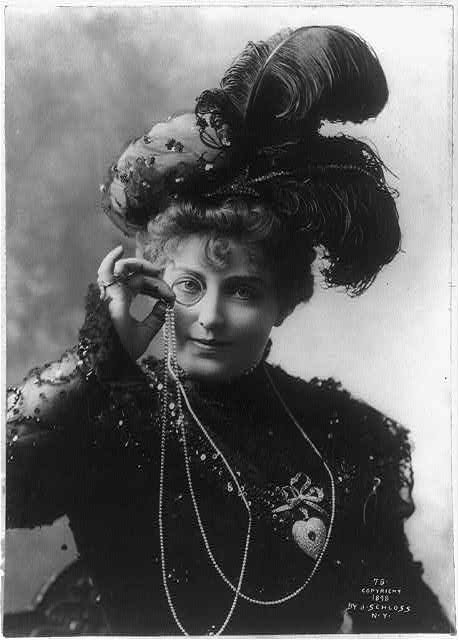
Course | Victorian Female Detectives with Olivia Rutigliano | Virtual
For modern readers, the great secret of the Victorian cultural world is that lady detective characters were among the most popular in the literature of the time. In this course, we will explore many of the most popular of these characters and interrogate how they reflected the spectrum of Victorian attitudes about women and how they both played into and resisted conventional Victorian conceptions of (and anxieties about) female ability, acumen, psychology, and labor.
